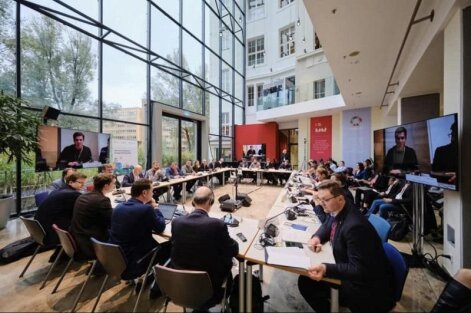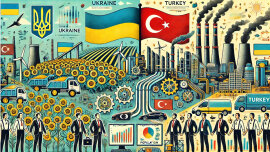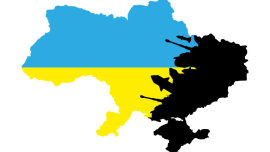Ukraine and Germany have joined forces to address critical energy issues and ensure sustainable recovery. Ukrainian communities are already working towards sustainable recovery and energy independence, and they need technical support and partnership. Working together is the way to successfully rebuild Ukraine in friendly cooperation with the public and international partners.
Intergovernmental cooperation and support
Cooperation between Ukraine and Germany in the field of green energy transformation is an important step towards Ukraine's sustainable recovery from Russian aggression. This important aspect was emphasized during the 3rd German-Ukrainian Energy Day, which took place on October 25, 2023, in Berlin and brought together representatives of governments, businesses and activists from both countries.
The meeting discussed further steps of cooperation in the energy sector, in particular within the framework of the German-Ukrainian Energy Partnership. The participants of the event emphasized the importance of this partnership, which is a key instrument for supporting Ukraine in its recovery from Russian aggression. Germany, as the largest donor to the Energy Support Fund for Ukraine, is actively contributing to the restoration of Ukraine's energy infrastructure, which was severely damaged by the war.
The forum provided a platform to discuss ways to move from emergency support to a long-term energy transition in Ukraine. The participants of the session not only analyzed the opportunities and challenges facing Ukraine but also focused on how Ukraine can contribute to the security of energy supply in Europe, even in circumstances forced by the military conflict.
An important point was hearing the opinions of key figures who attended the session. Yaroslav Demchenkov, Deputy Minister of Energy of Ukraine, and Tobias Lindner, State Minister at the Federal Ministry for Economic Cooperation and Development, discussed ways of long-term cooperation. Oleksandr Butenko, Deputy Minister for Communities, Territories and Infrastructure Development of Ukraine, and Volker Oel, Deputy Director General for Eastern Europe at the Federal Ministry for Economic Cooperation and Development (BMZ), emphasized the importance of decentralizing generation and improving energy efficiency.
Christina Haverkamp, Managing Director of the German Energy Agency (DENA), spoke about the importance of coordinating the efforts of all stakeholders for the success of the energy partnership.
The main topics of discussion included not only the response to the current energy crisis initiated by Russia but also the importance of rapidly introducing decentralized alternative energy sources to ensure the reliable and stable operation of the energy system. Participants noted that the war cannot become an obstacle to the energy transition, but rather should serve as an incentive to actively accelerate it.
Special attention was paid to the issue of support and cooperation between Ukraine and Germany. Germany has already made a significant contribution to the Energy Support Fund for Ukraine, exceeding EUR 100 million, and remains one of the key donor countries. These funds are helping Ukraine to carry out the largest repair of energy facilities in the country's history.
In addition to financial support, Germany is donating 30 aerial work platforms to Ukraine for the needs of electricity distribution system operators. This assistance is extremely important for power engineers who work on the front lines every day to restore power grids that have become a constant target of attacks by Russian terrorists.
In summary, the German-Ukrainian energy partnership is not only an important initiative but also an example of how countries can work together to ensure a sustainable recovery in the energy sector. This cooperation opens up new opportunities for both countries and contributes to building a future energy security architecture where energy is not an instrument of war, but rather contributes to sustainable development and environmental protection.
Common goals of Ukraine and Germany
Based on the idea of Net-Zero, the cooperation between Ukraine and Germany aims to see Ukraine as a country that widely implements energy efficiency and electrification. With a sustainable, flexible and decentralized energy system. Due to the devastation caused by the war, it makes no sense to restore old facilities. The forum participants agreed that it is time to build a new carbon-free energy system to produce clean and affordable energy for domestic consumption and export. Ukraine has all the necessary capabilities to do so.
Sustainable electricity and green hydrogen are considered to be the driving forces behind the energy transition. In February, Ukraine and the European Union signed a Memorandum of Understanding on a Strategic Partnership in Hydrogen and Synthetic Gases. The parties reaffirm their previous commitments made within the framework of the bilateral Ukrainian-German energy partnership.
Expansion of solar and wind power plants, development of energy storage systems, production of synthetic gases, and development of smart grids are all areas open to private investment.
Ukraine should be seen as a continental green energy centre in the European team, where energy production is combined with the development of green technologies. Natural resources such as ore and lithium are combined with engineering schools and a skilled workforce.
To realize the concept of a Ukrainian green hub, private business needs to be involved. It is necessary to convince them that investing in Ukraine is profitable in terms of return on investment and safe in terms of the legal environment. Successful reforms are a key prerequisite for this.
Therefore, the Ukrainian government should continue to work on legislation to create a predictable, transparent and more self-regulating energy market.
Next steps
The European Union and the German government expressed their support for the Ukrainian government in developing Ukraine's climate architecture. And not just in words. In particular, the Ukrainian Climate Office was opened in Kyiv the day before with the participation of the Minister of Environmental Protection and Natural Resources of Ukraine, the EU Commissioner and the Federal Minister of Germany. This initiative is part of the project "Strengthening Capacity for Climate Action", which is jointly funded by the European Union and the German government and implemented by GIZ.
As climate change is a cross-sectoral issue, the Climate Office will work on the basis of a cross-sectoral approach and will contribute to changes in the climate landscape of Ukraine. The Ukrainian Climate Office will operate on a project basis until its legalization.
Among its tasks, the UCO will become a centre of excellence, policy advocacy and innovation in Ukraine in the field of climate change mitigation, adaptation and sustainable development. It will also serve as a repository of green initiatives, projects, analytics and events related to environmental issues in Ukraine and facilitate cooperation between various stakeholders, including government, NGOs, research centres and businesses.
Ukraine and Germany will continue to cooperate for the sustainable recovery and development of the energy sector. The meeting between the Deputy Minister of Energy of Ukraine and the State Secretary of the Federal Ministry for Economic Cooperation and Development of Germany emphasized the need to support the Ukrainian energy sector. Special attention was paid to the supply of necessary equipment for Ukrainian energy companies. Ukraine thanked Germany for its contribution to the Energy Support Fund for Ukraine and considered the prospects of expanding public-private partnerships to attract German companies to projects in Ukraine.
Ukraine and Germany also discussed opportunities for cooperation in the areas of energy efficiency, renewable energy, smart grids, hydrogen technologies, and other areas. These efforts demonstrate a strong commitment to green energy and a sustainable future for Ukraine and Germany.
The role of civil society in today's context is of paramount importance for Ukraine and Germany, especially in the context of the green energy transformation and recovery from Russian aggression. Both countries recognize that civic initiatives and organizations play a key role in promoting Ukraine's sustainable recovery.
The German-Ukrainian Energy Partnership is an important tool for supporting Ukraine in its recovery process, especially in the face of the heavy losses caused by the aggression. Germany, as the largest donor to the Energy Support Fund for Ukraine, plays an important role in rebuilding the energy infrastructure that fell victim to the war.
At the same time, civil society organizations, with the support of the European Climate Foundation, are actively contributing to the Green Recovery of Ukraine. International cooperation is becoming an important element in the sustainable recovery of Ukrainian communities, aimed at phasing out fossil fuels and sustainable urban development without harming the environment. The key issue here is financial transparency in the reconstruction sector, which determines the success of the process.
Cooperation with international partners is important to achieve a complete phase-out of fossil fuels and create a sustainable future for Ukraine. This requires joint efforts from governments and civil society. Important aspects include transparency of EU support programs, political will to implement systemic reforms, public transparency of key state-owned infrastructure companies, international technical support and assistance in strengthening the capacity of communities.

























